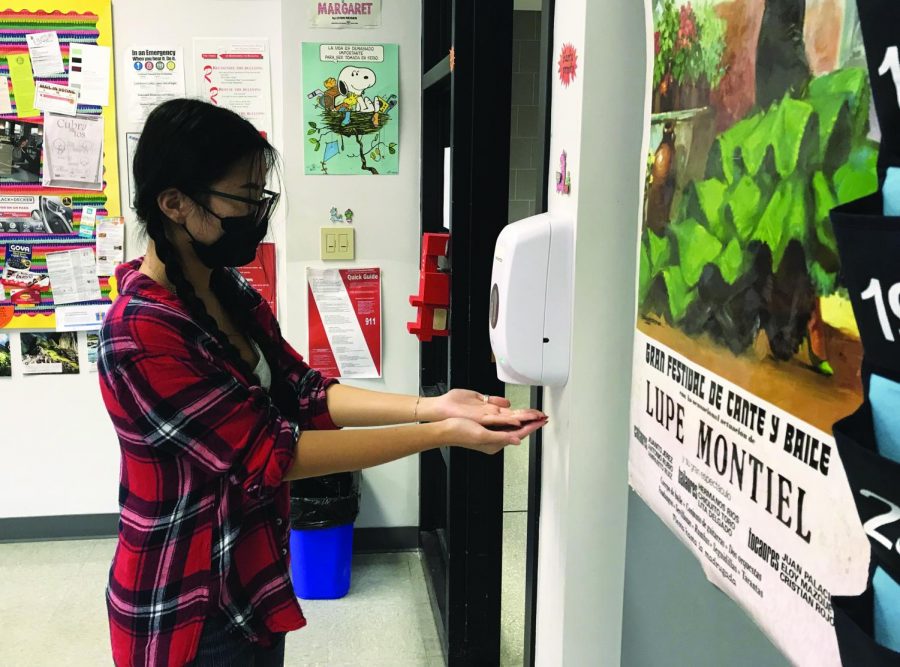COVID-19 patients handle prolonged symptoms
Since first contracting COVID-19 many people still experience prolonged symptoms from the virus. Doctors are still not sure as to why the virus has lingering effects, but are trying to assist these patients however they can.
Stopping the spread…Wearing a mask and frequently using hand sanitizer, junior Amy Tran hopes to prevent herself and others from getting sick. By taking these preventative measures, Tran negates her chances of contracting COVID-19.
By damaging the lungs, muscles, brain and heart, COVID-19 is continuing to affect some of those afflicted for months after they contract the virus, leaving both doctors and patients confused and frustrated.
According to the British Medical Association, about 10% of people who contracted COVID-19 have symptoms for more than three weeks.
Social studies teacher Amanda DiFranco has been living with extended coronavirus symptoms for about 18 months now.
DiFranco says she began feeling sick mid-December after going to an Eagles’ game, but after three months she still had a cough.
“By February, I was like ‘Man, this cough just won’t go away.’ It got better, but it wouldn’t fully go away,” DiFranco said.
According to DiFranco, the cough only became worse when coming back to school in September 2020.
DiFranco experienced coughing fits where she was left unable to breathe in between coughs due to how “powerful” they were. The fits were happening during classes and also at home.
“About three times a week, I’d have to step out and have the attack, out in the hallway with my inhaler,” DiFranco said.
Junior Mikayla Baker tested positive for COVID-19 in November of 2020, and is still experiencing headaches, sleeping issues and nausea from the virus.
According to Baker, her mother, who contracted COVID-19 at the same time as her, is still unable to smell or taste.
According to family care physician Noah Bass, many long hauler patients haven’t returned to “feeling like themselves” after their diagnoses.
Bass says the most common symptoms include fatigue, cough and shortness of breath, with less common symptoms being confusion or a “brain fog”.
Long hauler COVID-19 patients don’t always have the same symptoms from when they first contracted the virus Bass says.
According to Bass, these patients also go through periods of time in which their symptoms ease, and then become more harsh again.
“It’s not always that a long hauler patient feels the same way every day, sometimes they feel sick for a little while, then their symptoms get a bit better, and then they slide backwards again,” Bass said.
DiFranco says that while many people seem to be concerned about the mortality rate for COVID-19, they should also be concerned about the long term effects.
“It’s not just the people that lose their lives from it, it’s life-changing for many people who get in, and that, I think, is something we have to keep in mind,” DiFranco said.
The Delta variant of the coronavirus also adds stress to those already worrying about their struggle with COVID-19.
“There’s definitely the mental strain of worrying. The, ‘What if I do catch [the Delta variant] if I’m already struggling to breathe?’ What’s going to happen?” DiFranco said.
Treatment for long hauler patients varies case by case. According to Bass, scientists don’t understand why people are still feeling sick long after infection, and it’s hard to treat a disease you don’t understand yet.
Doctors are trying to learn all they can about long hauler coronavirus patients and why they are afflicted the way they are.
“Right now because everything is still so new, we’re still understanding the science of what happens to somebody after the Covid infection is still developing,” Bass said.
Bass says that the best way to prevent long hauler symptoms is to not get infected in the first place and to take preventative measures to lower your chances of infection.
“It’s still a good idea, that in close contact with people that you don’t know, to still continue to wear a mask. You still want to try and social distance. You still want to wash your hands a lot,” Bass said.






